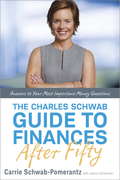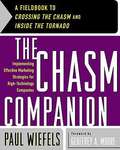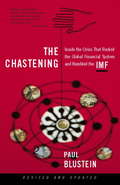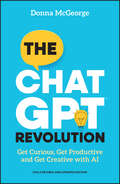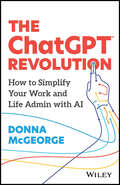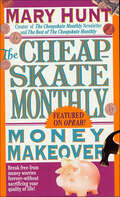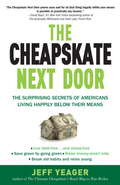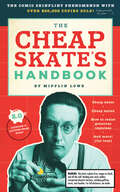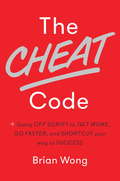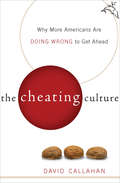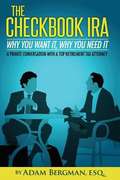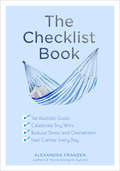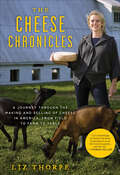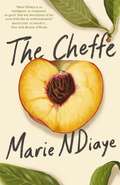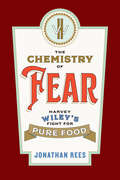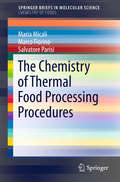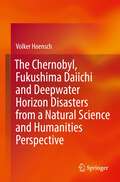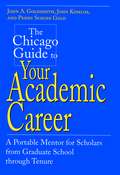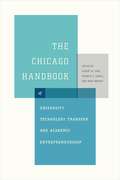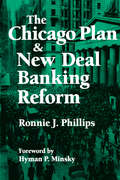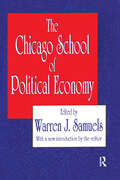- Table View
- List View
The Charles Schwab Guide to Finances After Fifty
by Carrie Schwab-Pomerantz Joanne CuthbertsonHere at last are the hard-to-find answers to the dizzying array of financial questions plaguing those who are age fifty and older.The financial world is more complex than ever, and people are struggling to make sense of it all. If you're like most people moving into the phase of life where protecting--as well as growing-- assets is paramount, you're faced with a number of financial puzzles. Maybe you're struggling to get your kids through college without drawing down your life's savings. Perhaps you sense your nest egg is at risk and want to move into safer investments. Maybe you're contemplating downsizing to a smaller home, but aren't sure of the financial implications. Possibly, medical expenses have become a bigger drain than you expected and you need help assessing options. Perhaps you'll shortly be eligible for social security but want to optimize when and how to take it.Whatever your specific financial issue, one thing is certain--your range of choices is vast. As the financial world becomes increasingly complex, what you need is deeply researched advice from professionals whose credentials are impeccable and who prize clarity and straightforwardness over financial mumbo-jumbo.Carrie Schwab-Pomerantz and the Schwab team have been helping clients tackle their toughest money issues for decades. Through Carrie's popular "Ask Carrie" columns, her leadership of the Charles Schwab Foundation, and her work across party lines through two White House administrations and with the President's Advisory Council on Financial Capability, she has become one of America's most trusted sources for financial advice. Here, Carrie will not only answer all the questions that keep you up at night, she'll provide answers to many questions you haven't considered but should.
The Chasm Companion
by Paul WiefelsIn The Chasm Companion, The Chasm Group's Paul Wiefels presents readers with a new analysis of the ideas introduced in bestselling author Geoffrey Moore's classic books, Crossing the Chasm and Inside the Tornado, and focuses on how to translate these ideas into actionable strategy and implementation programs. This step-by-step fieldbook is organized around three major concepts: how high-tech markets develop, creating market development strategy, and executing go-to-market programs based on the strategy.
The Chastening: Inside The Crisis That Rocked The Global Financial System And Humbled The Imf
by Paul BlusteinLauded by reviewers and scholars alike, Paul Blustein's 'The Chastening' examines the role of the International Monetary Fund in the series of economic crises that rocked the globe in the last decade. Based on hundreds of interviews with officials at the IMF, the World Bank, the U. S. Treasury, the Federal Reserve, the White House, and many foreign governments, 'The Chastening' offers a behind-the-scenes look at the Fund during an extraordinarily turbulent period in modern economic history and at a time when the IMF has become the object of intense political controversy. While the IMF and its overseers at the Treasury and the Fed have sought to cultivate an image of economic masterminds coolly dispensing effective economic remedies, the reality is that as markets were sinking and defaults looming, the guardians of global financial stability were often floundering, improvising, and feuding among themselves. 'The Chastening' casts serious doubt on the IMF's ability to combat of investor panics at a time when massive flows of money traverse borders and oceans. A readable, compelling account of the deeply flawed workings of the international political system, 'The Chastening' is vital reading for students and scholars of international diplomacy, government, and economic and public policy.
The ChatGPT Revolution: Get Curious, Get Productive and Get Creative with AI
by Donna McGeorgeLearn how to simplify your life with AI in this essential guide — now fully updated and revised, with even more ideas to spark creativity and boost efficiency The ChatGPT Revolution is the ultimate quick-start guide to unlocking the power of generative AI. We’re on the edge of an AI revolution … but what does that mean for you? It’s time to get curious about how the latest tech can help you handle your everyday load, at work and at home! Whether you’re overwhelmed by repetitive, time-consuming tasks or you’re simply looking for a fresh injection of creativity, ChatGPT has got your back. With this essential handbook, you’ll learn how quickly and easily apps like ChatGPT can turn your to-do list into a ta-da list. From emails and reports to planning your next meal or vacation, generative AI can help you simplify your daily tasks and responsibilities. The ChatGPT Revolution shows you exactly how to use this innovative tech to save on time and stress. Sharing practical tips and fun ideas, acclaimed productivity expert Donna McGeorge unpacks everything you need to know. Learn how generative AI is already being used in everyday life — and how tools like ChatGPT are transforming the future of work and life admin Understand the different tasks that AI tools like ChatGPT, Copilot, and DALL-E can do — and when and how to use these tools most effectively Get step-by-step advice for writing smart, specific prompts and follow-up queries to produce better results Discover tips for using ChatGPT on the go, with the mobile app and voice and photo capability Take control, revitalise your workflows, and overcome procrastination and creative blocks — with entertaining examples and activities for work, home, creative writing, and more Whether you’re a busy professional or you simply want an answer to the dreaded question ‘What’s for dinner?,’ The ChatGPT Revolution reveals how generative AI can make your life easier. AI technologies are here to stay. This is your invitation to join the revolution. Pick up this book and learn how to harness the power of AI, so you can free up more time and energy for the things that truly matter.
The ChatGPT Revolution: How to Simplify Your Work and Life Admin with AI
by Donna McGeorgeThe essential guide to using AI in your everyday life The ChatGPT Revolution is the ultimate quick-start guide to unlocking the power of AI tool ChatGPT. We’re on the edge of an AI revolution… but what does that mean for you? It’s time to get curious about how the latest tech can help you handle your everyday load, at work and at home! Whether you’re overwhelmed by repetitive, time-consuming tasks or you’re simply looking for a fresh injection of creativity, ChatGPT is the virtual assistant that’s got your back. With this essential handbook, you’ll learn how quickly and easily ChatGPT can turn your to-do list into a ta-da list. From helping you write emails and reports to planning your next meal or vacation, ChatGPT offers a new way to simplify your daily tasks and responsibilities. The ChatGPT Revolution shows you exactly how to use this innovative tech to save on time and stress. Sharing practical tips and fun ideas, author and acclaimed productivity expert Donna McGeorge unpacks everything you need to know. Learn how AI is already being used in everyday life — and how tools like ChatGPT are transforming the future of work and life admin Understand the different tasks ChatGPT can do and when and how to use it most effectively Get step-by-step advice for writing smart, specific prompts and follow-up queries that will produce better results Get curious and get productive, with entertaining examples, advice, and activities to take control, revitalise your workflows, and overcome procrastination and creative blocksWhether you’re a busy professional or you simply want an answer to the dreaded question ‘What’s for dinner?,’ The ChatGPT Revolution reveals how you can use ChatGPT as a tool to simplify your life. AI technologies are here to stay: this is your invitation to join the revolution. Pick up this book and learn how to harness the power of AI, so you can free up more time and energy for the things that truly matter.
The Cheapskate Monthly Money Makeover: Break Free Of Money Worries Forever
by Mary HuntYou don't need another budget. You need a money makeover that works.Reformed spendthrift and cred-card junkie Mary Hunt successfully turned her finances around. Now, she shares her own techniques, sound financial principles who went from being in the red to having more money, assets, and financial security than they ever dreamed possible.It's all here in this upbeat, user-friendly guide including:A self-diagnosis quiz to help you become lean, mean, and in controlThe amazing single step that will transform your financial situationA customized rapid-repay plan for debtsPractical, nearly, pain-free daily spending controlsBest tips from The Cheapskate Monthly newsletter for getting the most out of every dollarSpecial help for self-employment, bankruptcy, credit report problems..and more!With Mary Hunt's phenomenal tips, you can get into great financial shape!
The Cheapskate Next Door: The Surprising Secrets of Americans Living Happily Below Their Means
by Jeff YeagerHe's at it again, but this time he's not alone. America's Ultimate Cheapskate is back with all new secrets for how to live happily below your means, á la cheapskate. For The Cheapskate Next Door, Jeff Yeager tapped his bargain-basement-brain-trust, hitting the road to interview and survey hundreds of his fellow cheapskates to divulge their secrets for living the good life on less. Jeff reveals the 16 key attitudes about money - and life - that allow the cheapskates next door to live happy, comfortable, debt-free lives while spending only a fraction of what most Americans spend. Their strategies will change your way of thinking about money and debunk some of life's biggest money myths. For example, you'll learn: how to cut your food bill in half and eat healthier as a result; how your kids can get a college education without ever borrowing a dime; how to let the other guy pay for deprecation by learning the secrets of buying used, not abused; how you can save serious money by negotiating and bartering; and how - if you know where to look - there's free stuff and free fun all around you. The Cheapskate Next Door also features dozens of original "Cheap Shots" - quick, money saving tips that could save you more than $25,000 in a single year! Cheap Shots give you the inside scoop on: * How to save hundreds on kids' toys; * What inexpensive old-fashioned kitchen appliance can save you more than $200 a year; * How you can travel the world without ever having to pay for lodging; * What single driving tip can save you $30,000 during your lifetime; * Even how to save up to 40% on fine wines (and we're not talking about the kind that comes in a box). From simple money saving tips to truly life changing financial strategies, the cheapskates next door know that the key to financial freedom and enjoying life more is not how much you earn, but how much you spend. Jeff Yeager is the author of The Ultimate Cheapskate's Road Map to True Riches, and has appeared as a guest correspondent on the NBC Today Show and Discovery's Planet Green network. He is also the author of the popular blog The Green Cheapskate, www.TheDailyGreen.com Visit his website www.UltimateCheapskate.com From the Trade Paperback edition.
The Cheapskate's Handbook: Cheap Dates, Cheap Mates, How To Resist General Impulses, and More (For Less!)
by Mifflin LoweThe humorous guide to managing your money, now updated and stingier and saltier than ever.Packed with hilarious observations, unusual tips, and the stingiest advice money couldn’t buy, The Cheapskate’s Handbook is the perfect gag gift for your favorite miser—who might just be you. Skinflint Mifflin Lowe invites fellow cheapskates to come out of the closet in a celebration of all things free, complimentary, pro bono, and if need be, cheap. With advice on everything from avoiding generous impulses to creatively bumming off your neighbors, plus delightful watercolor illustrations, hilarious photographs, and Mifflin’s own “Miser’s Aptitude Test,” The Cheapskate’s Handbook will have you laughing and saving money at the same time. What a deal!Praise for The Cheapskate’s Handbook“This book is fun. Whether you truly have some Scrooge in your DNA or not, it’s hard to take the Miserliness Aptitude Test . . . explore the Roommate Fee List . . . or read the “How to Avoid Taking Your Spouse or Significant Other to a Movie” chapter and not crack a smile. Or more. Lowe is irreverent, silly, and quite often over the top. . . . It’s a 2.0 edition, after all, so he gives you the cheapskate view on Uber, Lyft, Miley Cyrus, and more.” —Ryan G. Van Cleave, Sarasota Scene
The Cheat Code: Going Off Script to Get More, Go Faster, and Shortcut Your Way to Success
by Brian WongHave you ever noticed that there are certain people who seem to get ahead just a bit faster than everyone else? You know, the types who always seem to be a bit ahead of the curve, to get noticed a bit more, and to achieve their goals a bit more quickly than the rest of the pack? And have you ever noticed how much this small edge can matter, and the outsized impact it can have on the trajectory of their careers? Twenty-four year old entrepreneur Brian Wong is one of these people, having graduated from college by age 18, having raised $24 million in venture capital to start his own company before he turned 25, and having grown that company into a global mobile advertising giant in just 4 years. His secret? The Cheat Code. Wong believes that most people -- even creative people -- have a tendency to follow a script; to do things the way others do them simply because that way works. But therein lies the secret at the heart of the Cheat Code: anyone can easily shortcut his or her way to success, simply by going slightly off script; by doing things just a little differently from everyone else. Here, Wong unlocks the power of the Cheat Code through 71 bite-sized and virtually effortless short-cuts to get a leg up on the competition, garner attention for ourselves and our ideas, and accelerate our success. For example: Cheat #7: Don't Ask - Announce Cheat #16: Know Your Superpower! Cheat #32: Make Boldness Your Genius Cheat #47: Know Who's the BossCheat #49: Get a Trademark HaircutCheat #51: Use Exclamation PointsCheat #55: Focus on What Won't Change Cheat #71: Imagine, What If? No matter where you aspire to go in your life or career, THE CHEAT CODE will help get you there - faster.From the Hardcover edition.
The Cheat Code: Going Off Script to Get More, Go Faster, and Shortcut Your Way to Success
by Brian WongHave you ever noticed that there are certain people who seem to get ahead just a bit faster than everyone else? You know, the types who always seem to be a bit ahead of the curve, to get noticed a bit more, and to achieve their goals a bit more quickly than the rest of the pack? And have you ever noticed how much this small edge can matter, and the outsized impact it can have on the trajectory of their careers? Twenty-four year old entrepreneur Brian Wong is one of these people, having graduated from college by age 18, having raised $24 million in venture capital to start his own company before he turned 25, and having grown that company into a global mobile advertising giant in just 4 years. His secret? The Cheat Code. Wong believes that most people -- even creative people -- have a tendency to follow a script; to do things the way others do them simply because that way works. But therein lies the secret at the heart of the Cheat Code: anyone can easily shortcut his or her way to success, simply by going slightly off script; by doing things just a little differently from everyone else. Here, Wong unlocks the power of the Cheat Code through 71 bite-sized and virtually effortless short-cuts to get a leg up on the competition, garner attention for ourselves and our ideas, and accelerate our success. For example:Cheat #7: Don't Ask – AnnounceCheat #16: Know Your Superpower! Cheat #32: Make Boldness Your Genius Cheat #47: Know Who's the BossCheat #49: Get a Trademark HaircutCheat #51: Use Exclamation PointsCheat #55: Focus on What Won't ChangeCheat #71: Imagine, What If?No matter where you aspire to go in your life or career, THE CHEAT CODE will help get you there - faster.
The Cheating Culture: Why More Americans Are Doing Wrong to Get Ahead
by David CallahanA public policy expert reveals how decades of deregulation and increasing inequality have fostered a culture of cheating across America. There have always been people who cut corners, but in The Cheating Culture, David Callahan demonstrates how cheating on every level—from the highly publicized corporate scandals to Little League fraud—has risen dramatically in recent decades. He then asks the simple yet provocative questions: Why all the cheating? Why now? Callahan pins the blame on today&’s dog-eat-dog economic climate. An unfettered market and unprecedented economic inequality have corroded our values and threaten the level playing field so central to American democracy itself. Through revealing interviews and extensive data analysis, Callahan takes readers on a revealing tour of cheating in America and offers a powerful argument for why it matters.
The Checkbook IRA: Why You Want It, Why You Need It
by Adam BergmanThis comprehensive guide covers everything—from the basic principles of a self-directed IRA to the complexities of retirement tax issues. As you learn how to grow your wealth faster and more securely by diversifying your investments among both traditional and alternative options, you’ll quickly realize just how easy and rewarding it is to be the one in charge of your future.
The Checklist Book: Set Realistic Goals, Celebrate Tiny Wins, Reduce Stress and Overwhelm, and Feel Calmer Every Day
by Alexandra FranzenMaster both major and minor tasks—by going back to the basics and writing out a simple checklist. It will change your life. The checklist is one of the world&’s oldest—and most effective—productivity systems. If anything, says entrepreneur Alexandra Franzen, it is just as valuable now as it was during the days of the Roman Empire, allowing us to tangibly plan our day and set in stone what we want to accomplish. There are countless apps and organizational systems promising to help us straighten out our lives, but often they only add to the madness and leave us feeling drained and overwhelmed. Learn how to: · Choose your highest priorities · Set realistic goals · Celebrate tiny wins · Feel calmer every day By physically writing down our tasks on a single piece of paper, we force ourselves to be realistic and limit how much we can do in a day. Too often, we cram our day with tasks and chores and leave almost no space for self-care or time with loved ones. We end up disappointed in our inability to complete our never-ending to-do list. Checklists help you accomplish what needs to be done—and enjoy things you want to be doing, too. &“There are thousands of books on how to become more organized and productive, but very few have the heart, soul, humor, and gentle encouragement of this book.&” —Ellen Fondiler, career and business strategist
The Cheese Chronicles: A Journey Through the Making and Selling of Cheese in America, From Field to Farm to Table
by Liz ThorpeThe Cheese Chronicles is an insider's look at the burgeoning world of American cheese from one lucky person who has seen more wedges and wheels, visited more cheesemakers, and tasted more delicious (and occasionally stinky) American cheese than anyone else. Liz Thorpe, second in command at New York's renowned Murray's Cheese, has used her notes and conversations from hundreds of tastings spanning nearly a decade to fashion this odyssey through the wonders of American cheese. Offering more than eighty profiles of the best, the most representative, and the most important cheesemakers, Thorpe chronicles American cheesemaking from the brave foodie hobbyists of twenty years ago (who put artisanal cheese on the map) to the carefully cultivated milkers and makers of today. Thorpe travels to the nation's cheese farms and factories, four-star kitchens and farmers' markets, bringing you along for the journey. In her quest to explore cheesemaking, she high-lights the country's greatest cheeses and concludes that today's cheesemakers can help provide more nourishing and sensible food for all Americans.Steve Jenkins, author of the celebrated Cheese Primer, calls this "the best book about cheese you'll ever read." The Cheese Chronicles is a cultural history of an industry that has found breakout success and achieved equal footing with its European cousins.
The Cheese and the Oligarchs: The Politics, the Media, and Israel's Dream of a Start-Up Nation
by Christine Snively Rafael Di TellaIsrael enjoyed the highest concentration of technology start-ups in the world per capita. Despite regional instability, the country maintained strong economic growth and was considered a high-tech powerhouse. But not all Israelis benefited. Between the 1980s and 2010s, income distribution had widened. By 2015, 20 business groups -- nearly all family-owned -- controlled one in four listed companies through corporate pyramids. Public anger over the high cost of living, which many believed was due to a lack of competition, led to a series of protests. Some academics and members of the Knesset (Parliament) called for reforms to limit the activities of corporate pyramids.
The Cheezburger Network
by John Deighton Leora KornfeldCheezburger Network was a Web publisher of humorous, user-contributed content, using social media for dissemination, and selling advertising against the traffic of 1 billion page views per quarter. In January 2011, it raised $30 million in venture capital for the network of 50 websites that featured an entertaining array of user-generated content. Beginning with a site based on pictures of cats with whimsical captions, it had grown into a small but impressive digital empire, riding waves of viral content. CEO Ben Huh prided himself on his ability to go from idea to implementation in just a few days, but this just-in-time method made strategic planning difficult. Profitable from day one and with $5 million of revenue across 50 brand identities, Huh's challenge was to evaluate his growth to date, to look critically at the digital media landscape, and to figure out how to best to spend the $30 million.
The Cheffe: A Culinary Novel
by Marie NDiayeThe Cheffe is born into a very poor family in Sainte-Bazeille in south-western France, but when she takes a job working in the kitchen of a couple in the Landes region, it does not take long before it becomes clear that the Cheffe has an unusual, remarkable talent for cooking. She dreams in recipes, she's always imagining food combinations and cooking times, she hunts down elusive flavours and aromas, and she soon usurps the couple's cook.But for all her genius, the Cheffe remains very secretive about the rest of her life. She becomes pregnant, but will not reveal her daughter's father. She shares nothing of her feelings or emotions. And when the demands of her work and caring for her child become too much, she leaves her baby in the care of her family, and sets out to open her own restaurant, which will soon win rave reviews and be lauded by all.But her relationship with her daughter will never be easy, and before long, it will threaten to destroy everything the Cheffe has spent her life perfecting.
The Chemical Feast: The Ralph Nader Study Group Report on Food Protection and the Food and Drug Administration
by James S. TurnerFor years the Food Group, as the food lobby is known in Washington, has nearly determined the limits of public dialogue and public policy about food quality. This report provides effective understanding of the secrecy-clouded situation.
The Chemistry of Fear: Harvey Wiley's Fight for Pure Food
by Jonathan ReesA fascinating examination of the controversial work of Harvey Wiley, the founder of the pure food movement and an early crusader against the use of additives and preservatives in food.Though trained as a medical doctor, chemist Harvey Wiley spent most of his professional life advocating for "pure food"—food free of both adulterants and preservatives. A strong proponent of the Pure Food and Drug Act of 1906, still the basis of food safety legislation in the United States, Wiley gained fame for what became known as the Poison Squad experiments—a series of tests in which, to learn more about the effects of various chemicals on the human body, Wiley's own employees at the Department of Agriculture agreed to consume food mixed with significant amounts of various additives, including borax, saltpeter, copper sulfate, sulfuric acid, and formaldehyde. One hundred years later, Wiley's influence lives on in many of our current popular ideas about food: that the wrong food can kill you; that the right food can extend your life; that additives are unnatural; and that unnatural food is unhealthy food. Eating—the process of taking something external in the world and putting it inside of you—has always been an intimate act, but it was Harvey Wiley who first turned it into a matter of life or death.In The Chemistry of Fear, Jonathan Rees examines Wiley's many—and varied—conflicts and clashes over food safety, including the adulteration of honey and the addition of caffeine to Coca-Cola, formaldehyde to milk, and alum to baking powder. Although Wiley is often depicted as an unwavering champion of the consumer's interest, Rees argues that his critics rightfully questioned some of his motivations, as well as the conclusions that he drew from his most important scientific work. And although Wiley's fame and popularity gave him enormous influence, Rees reveals that his impact on what Americans eat depends more upon fear than it does upon the quality of his research. Exploring in detail the battles Wiley picked over the way various foods and drinks were made and marketed, The Chemistry of Fear touches upon every stage of his career as a pure food advocate. From his initial work in Washington researching food adulteration, through the long interval at the end of his life when he worked for Good Housekeeping, Wiley often wrote about the people who prevented him from making the pure food law as effective as he thought it should have been. This engaging book will interest anyone who's curious about the pitfalls that eaters faced at the turn of the twentieth century.
The Chemistry of Thermal Food Processing Procedures
by Maria Micali Salvatore Parisi Marco FiorinoThis Brief reviews thermal processes in the food industry - pasteurization, sterilization, UHT processes, and others. It evaluates the effects on a chemical level and possible failures from a safety viewpoint, and discusses in how far the effects can be predicted. In addition, historical preservation techniques - smoking, addition of natural additives, irradiation, etc. - are compared with current industrial systems, like fermentation, irradiation, addition of food-grade chemicals. The Brief critically discusses storage protocols - cooling, freezing, etc. - and packing systems (modified atmosphere technology, active and intelligent packaging). Can undesired chemical effects on the food products be predicted? This Brief elucidates on this important question. On that basis, new challenges, that currently arise in the food sector, can be approached.
The Chernobyl, Fukushima Daiichi and Deepwater Horizon Disasters from a Natural Science and Humanities Perspective
by Volker HoenschIn our everyday imaginations we use the laws of nature with their tremendous possibilities of technical progress for the benefit of mankind. The three catastrophes of Chernobyl (26 April 1986), Fukushima Daichii (11 March 2011) and in the Gulf of Mexico, explosion of the drilling platform Deepwater Horizon (20 April 2010), have shaken this world view. Who directed this development? Is it a matter of human error or technical failure? For the answer, approaches from the natural sciences and the humanities are presented.
The Chicago Guide to Your Academic Career: A Portable Mentor for Scholars from Graduate School through Tenure (Chicago Guides to Academic Life)
by John Komlos John Goldsmith Penny GoldIs a career as a professor the right choice for you? If you are a graduate student, how can you clear the hurdles successfully and position yourself for academic employment? What's the best way to prepare for a job interview, and how can you maximize your chances of landing a job that suits you? What happens if you don't receive an offer? How does the tenure process work, and how do faculty members cope with the multiple and conflicting day-to-day demands? With a perpetually tight job market in the traditional academic fields, the road to an academic career for many aspiring scholars will often be a rocky and frustrating one. Where can they turn for good, frank answers to their questions? Here, three distinguished scholars—with more than 75 years of combined experience—talk openly about what's good and what's not so good about academia, as a place to work and a way of life. Written as an informal conversation among colleagues, the book is packed with inside information—about finding a mentor, avoiding pitfalls when writing a dissertation, negotiating the job listings, and much more. The three authors' distinctive opinions and strategies offer the reader multiple perspectives on typical problems. With rare candor and insight, they talk about such tough issues as departmental politics, dual-career marriages, and sexual harassment. Rounding out the discussion are short essays that offer the "inside track" on financing graduate education, publishing the first book, and leaving academia for the corporate world.
The Chicago Handbook of University Technology Transfer and Academic Entrepreneurship
by Mike Wright Albert N. Link Donald S. SiegelAs state support and federal research funding dwindle, universities are increasingly viewing their intellectual property portfolios as lucrative sources of potential revenue Nearly all research universities now have a technology transfer office to manage their intellectual property, but many are struggling to navigate this new world of university-industry partnerships. Given the substantial investment in academic research and millions of dollars potentially at stake, identifying best practices in university technology transfer and academic entrepreneurship is of paramount importance. The Chicago Handbook of University Technology Transfer and Academic Entrepreneurship is the first definitive source to synthesize state-of-the-art research in this arena. Edited by three of the foremost experts in the field, the handbook presents evidence from entrepreneurs, administrators, regulators, and professors in numerous disciplines. Together they address the key managerial and policy implications through chapters on how to sustain successful research ventures, ways to stimulate academic entrepreneurship, maintain effective open innovation strategies, and improve the performance of university technology transfer offices. A broad and ambitious work, the handbook offers comprehensive coverage for universities of all types, allowing them to confidently handle technology commercialization and further cultivate innovation.
The Chicago Plan and New Deal Banking Reform
by Hyman P. Minsky Ronnie J. PhillipsThis work presents a comprehensive history and evaluation of the role of the 100 percent reserve plan in the banking legislation of the New Deal reform era from its inception in 1933 to its re-emergence in the current financial reform debate in the US.
The Chicago School of Political Economy
by Warren J. SamuelsThe Chicago School of Economics is arguably the most successful and influential since World War II. This volume provides an interpretation of the Chicago school through constructive critique of its doctrines. It is an inquiry into the nature, role, and significance of the school and its doctrines within both the economics profession and the larger world of ideas and action. This volume offers a deeper understanding of the school, of its strengths and weaknesses, and of the tasks of any body of thought that hopes to comprise an alternative.
